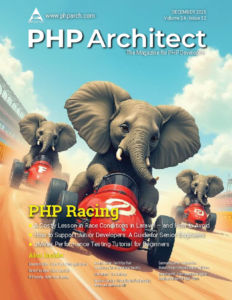Posts marked with “php”
PHP Puzzles: Compounding Interest
Last month, we looked at how to output an amortization table to see how compounding interest affects some amount of money. Printing out such a table assumes we have a certain set of inputs. Moreover, it’s tedious, even simple for a computer to do. Let’s look at other ways to calculate the time value of […]
Upgrading code with Rector, CQRS, Livewire, is PHP the Worst?, and more
Eric, John, and Oscar talk about changes behind the screen and the September 2021 issue, It’s Really an Upgrade. Topics Covered Changes in ownership at php[architect] The Rector project: using it to upgrade and downgrade library code. CQRS: using it to scale database reads and writes. JWTs and Security Livewire and JavaScript front end frameworks […]
Education Station: PHP is the Worst
By Chris Tankersley I have been programming for nearly twenty years at this point, and I have worked in various languages. At many of my previous jobs, as well as my current one, I have had the pleasure of working with PHP as the core language of my job. Since the first time I started […]
It’s Really an Upgrade
We often consider improvements from what they’ll cost us, in time, effort, or money, in the short term and undervaluing the long-term benefits we’ll get. We cover practices that look daunting but are worthwhile in this issue, including PHP refactoring tools like Rector, Commands and Queries, PHP Unit, Strategic Domain-Driven Design, Livewire, and more.
PHP Puzzles: Animated Life
In this installment, we continue looking at Conway’s Game of Life and our exploration of cellular automata. Now that we can calculate how one cell in our grid changes from one generation to the next, we can extend that to see how an arbitrarily sized grid changes from one cell to the next.
Design Patterns by Moonlight: When There Be Dragons
As our codebases become ever more complex, the cost of change rises as well. Any change or enhancement carries a risk of breaking something else. The problem is even more acute for people new to the project who’ve not yet learned the pitfalls waiting in that particular codebase. This month we’ll be examining the problem […]
Education Station: PHP is the Worst
I have been programming for nearly twenty years at this point, and I have worked in various languages. At many of my previous jobs, as well as my current one, I have had the pleasure of working with PHP as the core language of my job. Since the first time I started working with PHP, […]
Design Patterns by Moonlight: How I Do Interfaces
How do the building blocks come together to form a whole? Most resources on Design Patterns look at each pattern in isolation, allowing you to focus on the pattern and its uses without being distracted by side issues. What’s missing, I have found, are examples of fitting those patterns into a working system. This month we’ll look at a feature involving […]
Education Station: Attributing Code
One of the most requested features in PHP for a very long time was a concept known as Annotations. Annotations allow developers to add additional context and, most importantly, functionality to code without using a procedural approach. Many articles like to say it “adds metadata” to code, but I do not think that tells the whole story.
Mentoring and Teaching PHP
By Ken Marks Hiring a new developer is a risky endeavor. What if they don’t work out? What if they get bored? What if our organization’s needs change? In this article, we’ll discuss what it takes to foster a learning environment for your tech team, why you should encourage learning, what it takes to be […]














